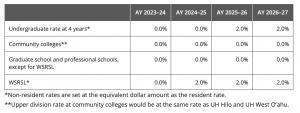Public meetings for proposed tuition increase in 2025, 2026
University of HawaiʻiThe University of Hawaiʻi 10-campus system is proposing a freeze on undergraduate tuition for two more academic years (AY) 2023–24 and AY 2024–25 followed by a 2% increase in resident tuition rates at the three UH universities in AY 2025–26 and a 2% increase in AY 2026–27. Non-resident undergraduate tuition rates would increase by the equivalent dollar amount in each of those two academic years. Community College and graduate tuition rates are proposed to be frozen for all four academic years EXCEPT for the UH Mānoa William S. Richardson School of Law (WSRSL), which would increase by 2% in each of the three years beginning in AY 2024–25 to generate revenue to support the law school.
The proposed tuition schedule can be viewed here.
Five public meetings have been scheduled starting November 15 to explain the proposal and provide an opportunity for students, parents, faculty, staff and the public to submit feedback via oral and written testimony. The feedback will be shared with the Board of Regents before it acts on the proposal next year by approving, deferring or modifying what is presented.
- UH Mānoa
Tuesday, November 15, 9–10:30 a.m.
IT Building, Room 105A/B
(Zoom webinar link will be sent via email prior to meeting)
- UH Hilo
Wednesday, November 16, 2–3:30 p.m.
Waiʻōlino Building, Room 101
(Zoom webinar link will be sent via email prior to meeting)
- Richardson Law School
Monday, November 21, 12-1:00 p.m.
Law School Classroom 2
(Zoom webinar link will be sent via email prior to meeting)
- UH Maui College
Tuesday, November 29, 2–3:30 p.m.
Kaʻaʻike 105A and 107
(Zoom webinar link will be sent via email prior to meeting)
- Kaua‘i Community College
Thursday, December 1, 2–3:30 p.m.
Fine Arts Auditorium
(Zoom webinar link will be sent via email prior to meeting)
Feedback can also be submitted via this Google form up until midnight, Sunday, December 4.
Recent Tuition Actions
The last action by the Board of Regents relating to tuition was in 2016, when resident undergraduate rates were modestly increased by 1% to 2% in AY 2018–19 and AY 2019–20. Those increases were fully committed to renewal, improvement and modernization of UH facilities. At that time, some tuition rates were decreased and tuition has been frozen since 2020.
Resident undergraduate tuition is currently $5,652 a semester at UH Mānoa, $3,836 a semester at UH Hilo and UH West Oʻahu and $1,572 a semester at the seven UH community colleges ($131 per credit and 12 credits is considered full-time).
Next steps
Based on testimony received, the administration may revise the proposed schedule. After the public meetings are completed on December 1, the administration will submit a tuition proposal to the BOR for approval, along with a summary of all of the testimony submitted. The regents are expected to consider the proposal in early 2023 when the public will have another opportunity to provide testimony.
October tuition presentation to board
During an informational presentation on the tuition schedule proposal at the October 26 public BOR meeting the administration stated that it was important to keep tuition rates flat for the next two academic years because the state’s economy is still in recovery and increases would create hardship for students and their families.
A modest increase starting in the fall 2025 semester was recommended when considering the rising costs of operating a 10-campus system with increasing energy costs, the high rate of inflation, consideration of tuition across the nation, and the expectation that the proposed small tuition increases would not significantly impact access to higher education.
The comprehensive presentation also included a history of tuition increases, the official process to raise tuition including board policy guidelines, historical data on the state appropriation and tuition rates, tuition rates compared to peers, projected revenues and expenditures and other financial and budget considerations.

